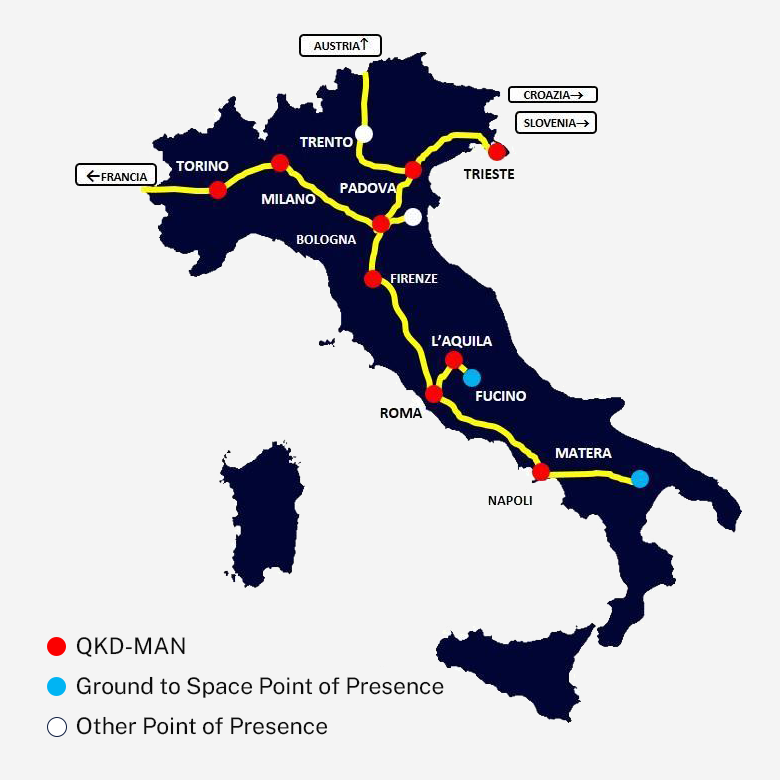The QUID (Quantum Italy Deployment) project, funded by the European Commission under the Digital Europe programme, will design and implement the future Italian network of the European Quantum Communication Infrastructure (EuroQCI). The initiative aims to create a European quantum communication infrastructure that will integrate quantum technologies and systems into terrestrial fiber-optic communication networks, including a space segment, to ensure comprehensive coverage across the EU and other parts of the world.
Common objectives in the European context
The main goal of the project is to protect European critical infrastructures, such as government institutions, air traffic control, healthcare facilities, banks, and power grids, from current and future cyber threats by providing a level of security against cyber risk that cannot be achieved with conventional technologies. In reality, only quantum tools have the capability to detect the presence of any malicious ‘eavesdroppers’ targeting communication channels.
The effects for Italy
Thanks to the QUID project, Italy will be able to count on the implementation of metropolitan quantum communication networks (QMANs), interconnected through the Italian Quantum Backbone, that covers parts of the country stretching from from Turin to Matera, passing through Rome Florence and Naples. In each QMAN, quantum key exchanges will be made between nodes using the Quantum Key Distribution (QKD) service.

Leonardo's contribution
Also, Leonardo through the QT (Quantum Technology) Lab, one of the 12 laboratories of the Leonardo Labs network is engaged, via QUID in developing the Quantum Metropolitan networks of Naples and Rome enabling their fiber-optic interconnection with the national backbone. This will allow in the first instance, the inclusion of the main southern areas around Naples area, while, in the second case, from the city of Rome, the connection with the industrial areas of L'Aquila and Fucino Space Centre, which will be the interface and connection infrastructure between the national network and the satellite component of EuroQCI.
Leonardo's QT lab is also working on the realization of free-space optical connections that will be added to fibre-optic connections to create dedicated links to strategic infrastructures (e.g., for the secure connection between Leonardo's headquarters and Thales Alenia Space in Rome). The presence among the project partners of the Italian Space Agency (ASI) and the interconnection with the Space Geodesy Centre in Matera, which also houses the e-GEOS Center, a joint venture between ASI (20%) and Telespazio (80 %), will enable interoperability within the space segment of a dedicated satellite constellation, again through free-space optical connections.
The role of Telespazio
In the framework of the QUID project, Telespazio's activities are mainly aimed at enhancing the Fucino Space Center, in view of its role as an interface and connection with the satellite component of EuroQCI. The Fucino Space Center will be the terminal point of the first regional long-distance connection, which will include secure repeaters ( the so called "trusted nodes") to connect with the Rome Metropolitan area. Free-space connections will also be made at Fucino, simulating future satellite links needed to exchange quantum keys to remote sites. Telespazio will also participate in the development of the Metropolitan network of Rome, in coordination with Leonardo, with the aim of establishing a node at its facilities and offering a demonstration of the service to important institutional bodies.
The QUID Consortium
QUID brings together leading Italian companies in the sector, the foremost research institutes involved in quantum communication, both for the ground and space segments, and universities involved in innovation and training. The consortium is led by the National Metrology Institute of Italy (INRiM), and in addition to Leonardo, Thales Alenia Space Italia and Telespazio, includes the National Research Council (CNR), Italian Space Agency (ASI), Cohaerentia, QTI, ThinkQuantum, TIM SPA, Telsy, TOP-IX Consortium, University of Naples Federico II, Politecnico di Milano, University of L'Aquila, University La Sapienza of Rome, University of Padua and University of Trieste.

